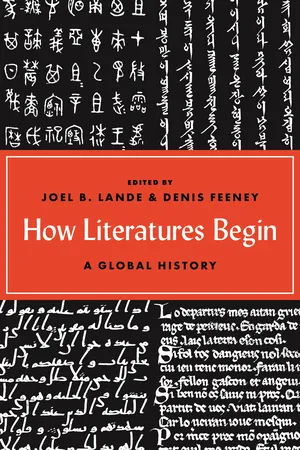
How Literatures Begin
A Global History
- 432 pages
- English
- ePUB (mobile friendly)
- Available on iOS & Android
About this book
A comparative history of the practices, technologies, institutions, and people that created distinct literary traditions around the world, from ancient to modern times
Literature is such a familiar and widespread form of imaginative expression today that its existence can seem inevitable. But in fact very few languages ever developed the full-fledged literary cultures we take for granted. Challenging basic assumptions about literatures by uncovering both the distinct and common factors that led to their improbable invention, How Literatures Begin is a global, comparative history of literary origins that spans the ancient and modern world and stretches from Asia and Europe to Africa and the Americas.
The book brings together a group of leading literary historians to examine the practices, technologies, institutions, and individuals that created seventeen literary traditions: Chinese, Japanese, Korean, Indian, Greek, Latin, Hebrew, Syriac, Arabic, English, Romance languages, German, Russian, Latin American, African, African American, and world literature. In these accessible accounts, which are framed by general and section introductions and a conclusion by the editors, literatures emerge as complex weaves of phenomena, unique and deeply rooted in particular times and places but also displaying surprising similarities. Again and again, new literatures arise out of old, come into being through interactions across national and linguistic borders, take inspiration from translation and cultural cross-fertilization, and provide new ways for groups to imagine themselves in relation to their moment in history.
Renewing our sense of wonder for the unlikely and strange thing we call literature, How Literatures Begin offers fresh opportunities for comparison between the individual traditions that make up the rich mosaic of the world's literatures.
The book is organized in four sections, with seventeen literatures covered by individual contributors: Part I: East and South Asia: Chinese (Martin Kern), Japanese (Wiebke Denecke), Korean (Ksenia Chizhova), and Indian (Sheldon Pollock); Part II: The Mediterranean: Greek (Deborah Steiner), Latin (Joseph Farrell), Hebrew (Jacqueline Vayntrub), Syriac (Alberto Rigolio), and Arabic (Gregor Schoeler); Part III: European Vernaculars: English (Ingrid Nelson), Romance languages (Simon Gaunt), German (Joel Lande), and Russian (Michael Wachtel); Part IV: Modern Geographies: Latin American (Rolena Adorno), African (Simon Gikandi), African American (Douglas Jones), and world literature (Jane O. Newman).
Frequently asked questions
- Essential is ideal for learners and professionals who enjoy exploring a wide range of subjects. Access the Essential Library with 800,000+ trusted titles and best-sellers across business, personal growth, and the humanities. Includes unlimited reading time and Standard Read Aloud voice.
- Complete: Perfect for advanced learners and researchers needing full, unrestricted access. Unlock 1.4M+ books across hundreds of subjects, including academic and specialized titles. The Complete Plan also includes advanced features like Premium Read Aloud and Research Assistant.
Please note we cannot support devices running on iOS 13 and Android 7 or earlier. Learn more about using the app.
Information
Table of contents
- Cover Page
- Title Page
- Copyright Page
- Contents
- Acknowledgments
- Contributors
- Introduction
- Part I. East and South Asia
- Part II. The Mediterranean
- Part III. European Vernaculars
- Part IV. Modern Geographies
- Conclusion
- Notes
- Bibliography
- Index